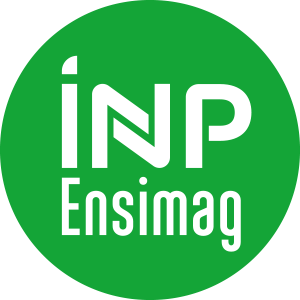Number of hours
- Lectures 16.5
- Projects -
- Tutorials 16.5
- Internship -
- Laboratory works -
- Written tests -
ECTS
ECTS 3.0
Goal(s)
To deepen knowledges on mathematical modeling with PDEs and their numerical resolution. We present mainly finite element methods whose theoretical bases, numerical schemes and programming aspects are studied.
Clement JOURDANA
Content(s)
I - Introduction to modeling through some examples: Heat transfer (1D/2D, Steady/Transcient), transport, elasticity (Lamé), fluid (Stokes), fluid-structure coupling (flow around an elastic obstacle). Comments on specific mathematical caveats of above problems.
II - Boundary value problems 1D. Weak forms.
III - Steady-state models / elliptic equations
Variationnal context. Symmetrical case and minization. Green formulaes.
IV - Finite elements method: basis functions, algorithms, implementation, a-priori estimates. Transport term, stabilization. Non linear case : linearization.
III - Unsteady models / Parabolic equations
Time scheme, splitting methods. FD-FE schemes.
IV - Possible extensions: ALE methods for fluid-structure models, models reduction,
Semi-lagrangian approach (characteristics), A-posteriori estimates, mesh refinement
Discontinuous-Galerkin methods. Some of these extensions could be part of the practical homework.
2nd year: Models of PDEs or Advacnce numerical methods; 1st year: numerical methods, mathematical analysis .
Evaluation : 33% of Projet (évaluation en continu et sur le rendu) and 67% of Examen Ecrit (2h)
Resit : 33% of Projet (évaluation en continu et sur le rendu) (reported score) and 67% of Examen Ecrit (2h)
Written exam (2 h) + practical homework
The exam is given in english only
The course exists in the following branches:
- Curriculum - Math. Modelling, Image & Simulation - Semester 8 (this course is given in english only)
Course ID : 4MMMVAM6
Course language(s): 
The course is attached to the following structures:
- Team Analysis-Computational Science
You can find this course among all other courses.
G. ALLAIRE : Analyse numerique et optimisation . Edts de l’école polytechnique. Version PDF disponible sur la page de l'auteur.
A. QUARTERONI and A. VALLI : « Numerical approximation of PDEs », Springer.
A. Ern, J.-L. Guermond, Eléments finis : théorie, applications, mise en œuvre, Springer.
P.-A. RAVIART et J.-M. THOMAS : Introduction à l'analyse numérique des équations aux dérivées partielles, Coll. Mathématiques appliquées pour la Maîtrise, Dunod



